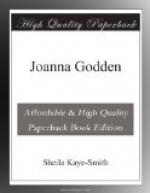Albert was able to get off on the Friday afternoon, and arrived at Ansdore in time for the splendours of late dinner and a bath in the new bathroom. There was no doubt about it, thought he, that he was on a good thing, whichever way it ended. She must have pots of money ... everything of the very best ... and her sister marrying no end of a swell—Ernley, who played for Sussex, and was obviously top-notch in every other way. Perhaps he wouldn’t be such a fool, after all, if he married her. He would be a country gentleman with plenty of money and a horse to ride—better than living single till, with luck, he got a rise, and married inevitably one of his female acquaintances, to live in the suburbs on three hundred a year.... And she was such a splendid creature—otherwise he would not have thought of it—but in attraction she could give points to any girl, and her beauty, having flowered late, would probably last a good while longer....
But—. That night as he sat at his bedroom window, smoking a succession of Gold Flake cigarettes, he saw many other aspects of the situation. The deadly quiet of Ansdore in the night, with all the blackness of the Marsh waiting for the unrisen moon, was to him a symbol of what his life would be if he married Joanna. He would perish if he got stuck in a hole like this, and yet—he thus far acknowledged her queenship—he could never ask her to come out of it. He could not picture her living in streets—she wouldn’t fit—but then, neither would he fit down here. He liked streets and gaiety and noise and picture-palaces.... If she’d been younger he might have risked it, but at her age—thirteen years older than he (she had told him her age in an expansive moment) it was really impossible. But, damn it all! She was gorgeous—and he’d rather have her than any younger woman. He couldn’t make her out—she must see the folly of marriage as well as he ... then why was she encouraging him like this?—Leading him on into an impossible situation? Gradually he was drifting back into his first queer moment of antagonism—he felt urged to conquest, not merely for the gratification of his vanity nor even for the attainment of his desire, but for the satisfaction of seeing her humbled, all her pride and glow and glory at his feet, like a tiger-lily in the dust.
The next day Joanna drove him into Lydd, and in the afternoon took him inland, to Ruckinge and Warehorne. These drives were another reconstruction of her life with Martin, though now she no longer loved Albert only in his second-coming aspect. She loved him passionately and childishly for himself—the free spring of his hair from his forehead, not merely because it had also been Martin’s but because it was his—the impudence as well as the softness of his eyes, the sulkiness as well as the sensitiveness of his mouth, the unlike as well as the like. She loved his quick, Cockney accent, his Cockney oaths when he forgot himself—the way he always said “Yeyss” instead of “Yes”—his little assumptions of vanity in socks and tie. She loved a queer blend of Albert and Martin, the real and the imaginary, substance and dream.




